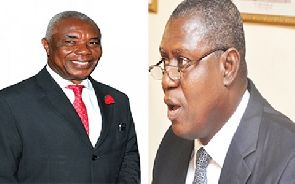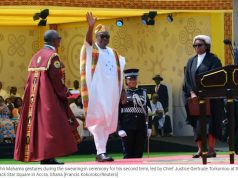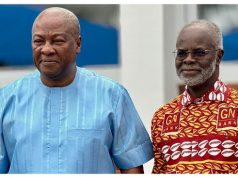After 47 years of public service, the Chief Justice, Georgina Theodora Wood, will retire on June 8, 2017, and two names remain in the race to replace her as Ghana’s next Chief Justice.
The top contenders are: Justice Victor Jones Mawulom Dotse and Justice Kwasi Anin-Yeboah.
The top two contenders lead from 14 Supreme Court potentials.
The Chief Justice is appointed by the President of Ghana, acting in consultation with the Council of State, and with the approval of the country’s Parliament.
As at March 2016, the list of Supreme Court Judges, according to seniority includes: Georgina T. Wood – November 12, 2002, William. A. Atuguba – November 30, 1995, Sophia A. B. Akuffo – November 30, 1995, Julius Ansah – October 15, 2004, Mrs Sophia. O. Adinyira – March 15, 2006 and Jones Dotse – June 11, 2008.
The rest are: Kwasi Anin-Yeboah – June 11, 2008, Paul Baffoe Bonnie – June 11, 2008, Nasiru Sule Gbadegbe – November 2, 2009, Mrs Vida Akoto-Bamfo – November 2, 2009, Alfred Anthony Benin – November 9, 2012, J. B. Akamba – November 9, 2012, Yaw Appau – June 29, 2015 and Gabriel Pwamang – June 29, 2015.
Speculations were rife that Chief Justice, Georgina Theodora Wood, would stay in office to the end of this year but she has categorically denied that, bringing finality on the issue.
The probable candidates many people in the legal fraternity talk about are: Justice Dotse and Justice Anin-Yeboah.
It must be noted that people tend to associate the Justices with political affiliation, whether right or wrong, based on which administration appointed them.
And because only the New Patriotic Party (NPP) and the National Democratic Congress (NDC) have been given the chance by Ghanaians to rule since the country returned to democratic rule in 1993, all the Supreme Court judges were either appointed by the NDC or NPP.
Observers believe it could have been the turn of Justice William Atuguba, the most senior at the bench, but he is also due for retirement soon.
Even though two women Sophia A. B. Akuffo, who became Supreme Court Judge on November 30, 1995, and Mrs Sophia. O. Adinyira, who became Supreme Court Judge on March 15, 2006, are seniors to Justice Dotse and Justice Anin-Yeboah, they are not seen as possible replacements because Chief Justice, Georgina Theodora Wood, has held the post for close to 10 years, and appointing another woman CJ is clearly not on the table.
The new Chief Justice is likely to lose some power and authority when the government commences the implementation of the recommendations of the Constitutional Review Commission.
Composition of the Supreme Court
Government has accepted that the recommendation that Article 128(1) be amended to provide for a maximum of 15 Justices, and it should remain non-entrenched
Removal of the Chief Justice from Office
Government has also accepted the recommendation that the Constitution be amended to explicitly require that a prima facie case be established as a prerequisite for the commencement of any proceedings for the removal of the Chief Justice.
Establishment of the Position of the President of the Court of Appeal
Again, Government has accepted the recommendation that the provisions of the Constitution which do not provide for a President of Court of Appeal be retained.
Government has also endorsed the recommendation that Administrative Guidelines should be developed which allow the practice where the most senior Justice of the Court of Appeal acts as the de facto head of the courts, and cede some of the administrative functions of the Chief Justice, such as the empanelling of the Court of Appeal, to the office of the de facto President of the Court of Appeal.
Empanelling Powers of the Chief Justice
Government has accepted the recommendation that the current constitutional provision be retained.
Government has also endorsed the following recommendations of the CRC that: Where the Chief Justice has a personal interest in a case, he should cede the authority to empanel to the most senior Justice of the Supreme Court.
In this regard, Government is of the view that it is the Constitution that should be amended to achieve the desired effect and not the administrative change as recommended because of the decision in the Akufo-Addo v Quarshie-Idun [1968] GLR 667.
The Chief Justice should adopt guidelines, elaborating mechanisms, including the use of electronic methods of empanelling the Superior Courts, to ensure transparency in that respect.
About Anin-Yeboah
Justice Anin-Yeboah was appointed to the Supreme Court on June 11, 2008
He is a lecturer in Civil Procedure at Ghana School of Law.
As an ardent football fan, Justice Yeboah serves on the adjudicatory chamber of the FIFA Ethics Committee, an appointment that will last for four years.
Before his appointment, Justice Yeboah had served on various judicial bodies in the Ghana Football Association (GFA), including the Disciplinary Committee and the Appeals Committee.
He also served on the Appeals Committee of the Confederation of African Football.
The Adjudicatory Chamber of the Ethics Committee reviews the reports of the Investigatory Chamber and decides whether a case should be proceeded or closed.
After conducting further investigations, if deemed necessary, the Adjudicatory Chamber sends a report to all parties involved and asks for their statements.
The Adjudicatory Chamber has to finally decide on appropriate sanctions after conducting further investigations, if necessary.
About Justice Dotse
Justice Victor Jones Mawulom Dotse was elevated to the Supreme Court Bench in Ghana on June 11, 2008. Prior to being appointed a High, Court Judge in June 2002, Jones Dotse has had a distinguished career at the Ghana Bar spanning November 1978 when he was called to the Bar up to 2002 when he was elevated to the Bench, a period of some 23 years at the Bar.
During this period, he had been a State Attorney for three years, and worked for 20 years as a private Legal Practitioner.
Justice Jones Dotse graduated from the University of Ghana, Legon, in June 1976 with an LL.B (Hons) Degree. In 1978, he was awarded a BL Certificate in Law from the Ghana School of Law and called to the Ghana Bar in November, 1978.
He has held many positions at the Bar, rising to become a Regional President of the Bar Association and member of the Legal Service Board in 2001 to 2002.
Justice Jones Dotse is a team player and gets on well with all manner of persons.
He has attended several courses in the United States, Canada and Nigeria just to mention a few in his legal and judicial career.
Notable among these are:
• International Bar Association (IBA) Conference on Oil and Gas, Abuja, Nigeria, 1999.
• International Visitor Programme to the United States, March to April, 1994
• Special Single Country visit to the United States in August, 2004.
• Special Judicial Faculty Training of the National Judicial Institute of Canada, Ottawa, January to February, 2006.
• Commonwealth Judicial Education Institute (CJEI) Halifax, Canada, June 2006.
Justice Jones Dotse has received training as an ADR Practitioner from the Faculty of Law, University of Ghana in 1977.
Since 2005, he has been a member of the ADR Committee of the Judicial Service of Ghana and was Chairman of the said committee from January 2009 up to July 31, 2009.
Justice Jones Dotse was, in February, 2008, appointed as Justice of the Supreme Court of the Republic of The Gambia.
Jones was born in June 1953 and hails from Kpando in the Volta Region of the Republic of Ghana. He is married with three daughters and is a Christian.








